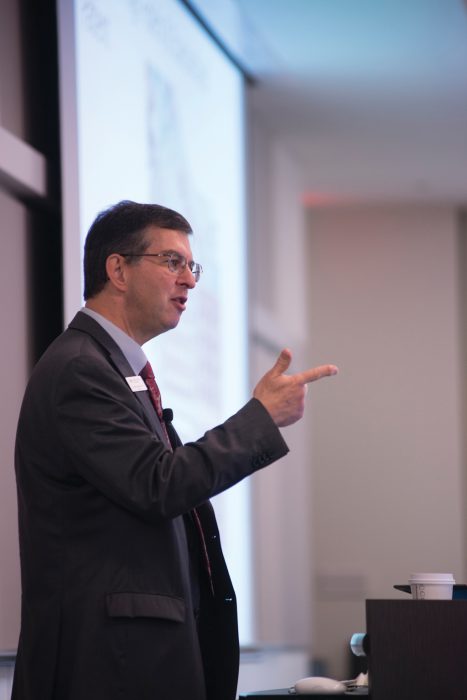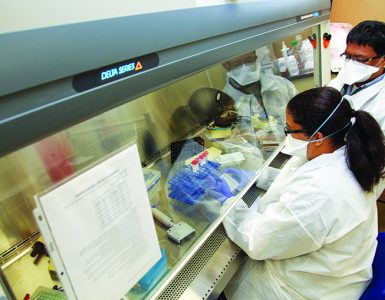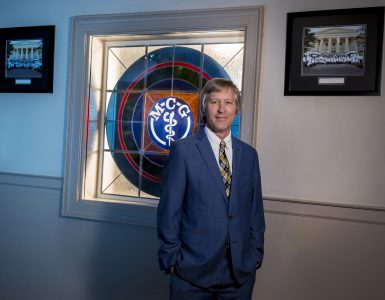VIEWPOINT
Paul M. Wallach, MD
Vice Dean for Academic Affairs;
Leon Henri Charbonnier
Endowed Chair in Medicine
During the last week of January 2016, six colleagues from medical schools across the United States came to visit the Medical College of Georgia as members of a site survey team for the Liaison Committee on Medical Education. Accreditation is an important marker indicating good health of an educational program. The process for achieving LCME accreditation has become more rigorous and challenging over the last decade, and particularly so during the 2015-16 academic year because of a newly published set of accreditation standards and a modified database that is central to the evaluation. The scrutiny of the process is like getting a physical exam, full body MRI, upper endoscopy, colonoscopy and random organ biopsies all at once!
We are very proud that MCG came through the process successfully and we received full accreditation for eight years – a clean bill of health! We have a few items we will report to the LCME, many reflecting recently implemented programs that require follow-up data.
Many participated and contributed to the preparation for our re-accreditation process. Incredible efforts went into review of our documents and arranging logistics. The question is: Beyond achieving the accreditation imprimatur, was the process worth all that went into it?
[su_note note_color=”#efefee” text_color=”#000000″ class=”story-side-box”]A Group Effort
Dr. Kelli Braun, MCG graduate and faculty member in the Department of Obstetrics and Gynecology who was recently named interim associate dean of admissions, and Dr. William Pearson, assistant professor in the Department of Cellular Biology and Anatomy, served as faculty co-leads for the Steering Committee for the LCME review process. Committee members also include Dr. Andria Thomas, associate dean for evaluation, accreditation, and CQI, who contributed significantly to the preparation for and implementation of the successful LCME site visit; Dr. Vaughn McCall, chairman of the Department of Psychiatry and Health Behavior; Dr. Amyn Rojiani, chairman of the Department of Pathology; Dr. Andy Albritton, senior associate dean for curriculum; Dr. Leslie Petch-Lee, assistant dean for curriculum of Augusta University/University of Georgia Medical Partnership campus in Athens; Jeanette Balotin, chief of staff; Vice Dean Paul Wallach; and Dean Peter Buckley.
Additionally, 85 faculty members from all MCG campuses participated in six self-study committees. Nearly 70 students from all four years of medical school were involved in the Independent Student Analysis that preceded MCG’s self-study to ensure strong student input on the strengths and weaknesses of their medical school. The LCME is jointly sponsored by the Association of American Medical Colleges and the American Medical Association.[/su_note]
Beginning in the fall of 2012, soon after my arrival as MCG’s vice dean, we began a process of self-reflection and careful data analysis where we employed formal Continuous Quality Improvement, or CQI, methodologies.
This CQI process permitted a deliberate and thoughtful approach to making our school better:
- We actively engaged our learners as partners in the process and listened carefully to their comments, criticisms and concerns.
- We reviewed internal and nationally benchmarked data and targeted any item that fell below the national average or our internal expectations for MCG.
- We engaged faculty committees to review the accreditation standards and elements, and they offered critical analysis about how we were succeeding as a school.
Let me share a few notable outcomes:
- We embarked on an inclusive strategic planning process.
- We learned that our approach to CQI, an internally devised process, became the newest of the accreditation requirements and we were already doing it.
- MCG has one of the largest medical schools by class size, and we found that staffing for student affairs and curriculum were inadequate. We in-creased the support for our medical students:
- Class dean student affairs model: Each class has its own student affairs dean.
- Class curriculum director model: Expanding on the success of year 1 and 2 leaders, we engaged two senior leaders for years 3 and 4.
- Implemented through a regional campus model, we view Georgia as our classroom and took steps to improve functional integration of our campuses.
- Student summer research and student participation has soared thanks to support from the dean (for the class of 2016, 75 percent of students participated in research with a faculty member).
- Opportunities for enhancing the student learning environment were recognized and implemented. MCG requested and received $5.7 million to support additional educator faculty.
- Physical space for student learning and study was improved dramatically with the opening of the J. Harold Harrison, M.D. Education Commons and renovations on the partnership campus in Athens and also in the clinical environments.
- The Curriculum Oversight Committee carefully reviewed pedagogy, assessment and curriculum topics and improved our program in many ways. The COC also assured that policies were current and appropriate.
- Service learning became a formal requirement.
- Public health and health disparities education was formalized in our curriculum.
- Interprofessional education opportunities were expanded.
- Students now all receive clerkship grades within the required time frame.
- The diversity of our medical students has increased significantly.
- Systems for academic and career counseling were developed and implemented.
- The university financial aid office improved its service to our students.
In all, the overall satisfaction of our graduating students with their education has improved each year since this approach to CQI was instituted in 2012.
Just four years ago, our students’ satisfaction was in the bottom 10 percent of schools. We are now in the top 20 percent.
Was the effort that went into the accreditation process worth it?
Based on all that has been accomplished in the last four years, it seems that the careful attention to CQI as part of an accreditation process has yielded important results. Our learners (students and residents), faculty, staff and the communities we serve all benefit from MCG performing at its best. It seems the process is well worth it.
Well, enough looking in the rearview mirror. Looking forward, relentless CQI will not just exist for accreditation, but will continue to serve as an important tool in our ongoing pursuit of excellence.









